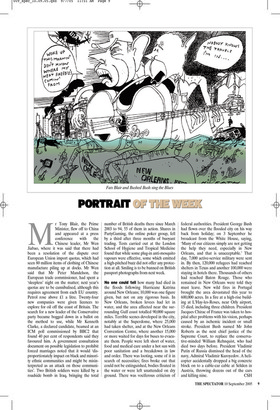PORTRAIT OF THE WEEK M r Tony Blair, the Prime Minister,
flew off to China and appeared at a press conference with the Chinese leader, Mr Wen Jiabao, where it was said that there had been a resolution of the dispute over European Union import quotas, which had seen 80 million items of clothing of Chinese manufacture piling up at docks. Mr Wen said that Mr Peter Mandelson, the European trade commissioner, had spent a ‘sleepless’ night on the matter; next year’s quotas are to be cannibalised, although this requires agreement from each EU country. Petrol rose above £1 a litre. Twenty-four new companies were given licences to explore for oil off the coast of Britain. The search for a new leader of the Conservative party became bogged down in a ballot on the method to use, while Mr Kenneth Clarke, a declared candidate, beamed at an ICM poll commissioned by BBC2 that found 40 per cent of respondents said they favoured him. A government consultation document on possible legislation to prohibit forced marriages noted that it would ‘disproportionately impact on black and minority ethnic communities and might be misinterpreted as an attack on those communities’. Two British soldiers were killed by a roadside bomb in Iraq, bringing the total number of British deaths there since March 2003 to 94, 55 of them in action. Shares in PartyGaming, the online poker group, fell by a third after three months of buoyant trading. Tests carried out at the London School of Hygiene and Tropical Medicine found that while some plug-in anti-mosquito vapours were effective, some which emitted a high-pitched buzz did not offer any protection at all. Smiling is to be banned on British passport photographs from next week.
No one could tell how many had died in the floods following Hurricane Katrina around New Orleans; 10,000 was one figure given, but not on any rigorous basis. In New Orleans, broken levees had let in water, and the area affected near the surrounding Gulf coast totalled 90,000 square miles. Terrible scenes developed in the city, notably at the Superdome, where 25,000 had taken shelter, and at the New Orleans Convention Centre, where another 15,000 or more waited for days for buses to evacuate them. People were left short of water, food and medical care under a hot sun with poor sanitation and a breakdown in law and order. There was looting, some of it in search of necessities; fires broke out that could not be extinguished, bodies floated in the water or were left unattended on dry ground. There was vociferous criticism of federal authorities. President George Bush had flown over the flooded city on his way back from holiday; on 3 September he broadcast from the White House, saying, ‘Many of our citizens simply are not getting the help they need, especially in New Orleans, and that is unacceptable.’ That day, 7,000 active-service military were sent in. By then, 120,000 refugees had reached shelters in Texas and another 100,000 were staying in hotels there. Thousands of others had reached Baton Rouge. Those who remained in New Orleans were told they must leave. New wild fires in Portugal brought the area devastated this year to 600,000 acres. In a fire at a high-rise building at L’Hay-les-Roses, near Orly airport, 15 died, including three children. President Jacques Chirac of France was taken to hospital after problems with his vision, perhaps caused by an ischemic incident or small stroke. President Bush named Mr John Roberts as the next chief justice of the Supreme Court, to replace the conservative-minded William Rehnquist, who had died two days before. President Vladimir Putin of Russia dismissed the head of the navy, Admiral Vladimir Kuroyedov. A helicopter accidentally dropped a big concrete block on to a cable-car cable at Sölden in Austria, throwing dozens out of the cars and killing nine. CSH
























































 Previous page
Previous page